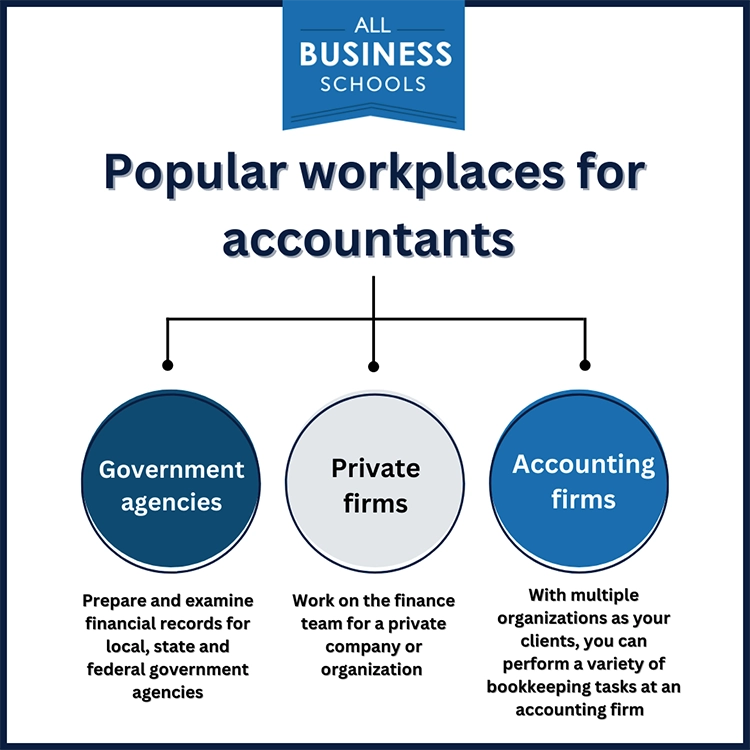In this Article
Accounting Education and Career Guide
What do accountants do? (Duties, skills & workplaces)

Accountants play a crucial role in maintaining and analyzing financial records for organizations. They are responsible for ensuring the effective management of money by tracking transactions, preparing financial statements, and providing valuable insights for decision-making. Accountants contribute to financial stability and help businesses navigate regulatory requirements while optimizing their financial performance.
Accountant job description
Having reliable financial information is vital for any business or government organization. No longer considered just "number crunchers," accountants play a vital role in the sound financial management of a company.
Businesses rely on accounting staff to navigate the complexities of changing tax laws and other regulations. Accountants make necessary tax and financial filings needed to stay in compliance.
The financial records that accountants prepare allow a business to accurately track income, expenses and other data. Businesses also use the information to assess their financial health, create budgets and make financial projections vital to investors. Often, accountants become certified management accountants and develop strategic business recommendations based on these financial findings.
An accountant's work allows a business to accurately track income, expenses and other data. Businesses also use the information to assess their financial health and make financial projections vital to investors.
"Society thinks that accounting is kind of dead because computers can do that work," said Angel Chatterton, senior instructor of accountancy at the University of Illinois Urbana-Champaign. But, she said, it's not that simple:
"What has happened in the last five to seven years is now we have to train our students to acknowledge and know what the computer is doing behind the scenes. So just in case there are coding errors, they correct them. Now we have to be at this higher level."
Chatterton said an accountant's critical thinking skills are as crucial as ever: "We can use our human judgment in understanding what accounting laws are, applying them, synthesizing them and helping make decisions."
On the job, accountants:
What skills and traits do you need to be successful?
An affinity for numbers is crucial for a successful accountant, but so are strong communication skills. Here are some strengths and traits that accountants need to excel at their work.
Strong math skills
While you don't need to be a math expert, it's important to have solid math skills. "You have to have a love of puzzles," Chatterton said.
Knowledge of business principles
You'll need to understand how businesses operate, both in general and the specific operations of your business.
Analytic and problem-solving skills
Deciphering financial information can be like a puzzle sometimes, and having the ability—and desire—to analyze and solve problems is a great asset.
Tech-savvy
Accounting uses many advanced software programs, and you'll need to understand how technology operates and how to keep data secure.
Good verbal and written communication
Successful accountants can communicate comfortably with both clients and stakeholders and explain information in terms they will understand.
Having data analytics and communication skills are particularly valuable, Chatterton said. Curiosity and the ability to listen and observe, are equally important.
"If you can tell a story with the numbers to a variety of audiences and if you can communicate what these numbers mean to you and how you can make a difference with the numbers, you are a golden child in the accounting world," she said. "Those are the skills you need. They are very valuable."
Where do accountants work?
Accountants and auditors usually work in offices, although some work from home. Auditors may travel to their clients' workplaces.
Most accountants will work in one of these areas:
Government agencies: You may prepare and examine financial records for an agency, or review the financial filings of those required to report to the agency. Accountants working for local, state or federal governments may also be responsible for making sure that tax money is collected and managed legally.
Private firms: You may prepare and maintain financial documents, complete tax returns and make sure taxes are paid, and file any required compliance documents for the business. Small companies may need just one or two accountants, while larger companies will have an accounting department with numerous team members.
Accounting firms: You may work for a variety of clients, performing general bookkeeping and accounting tasks, preparing taxes and conducting audits. You may also start your own accounting firm.

How can you advance your career?
Advancement in the field can take many forms. Entry-level accountants may see their responsibilities increase with each year of practice, and this may qualify them to move into management positions at higher salaries.
Accounts in senior manager, leadership or executive roles generally will need a master's degree in accounting or a master's of business administration (MBA) with a focus on accounting.
Accounting specialties
Some accountants opt to specialize in a particular area. Here is a sampling of specialties they can pursue:
Moving into managerial and executive roles
Accountants who excel may become supervisors, managers or partners in a firm. They may also open their own public accounting firms, or transfer to management and internal positions in private firms.
For example, management accountants often start as cost accountants or junior internal auditors. They can advance to accounting manager, chief cost accountant, budget director or manager of internal auditing.
Some move into business administration or corporate finance, where they may serve as controllers, treasurers, financial vice presidents, chief financial officers or corporation presidents.
What jobs can you get with an accounting degree?
There are several accounting degrees. The lowest, an associate degree in accounting, will qualify you for clerical roles under an accountant.
There are five common types of accountants. For these roles, you'll need at least a bachelor's degree and to become a certified public account (CPA), a credential that you can earn after you complete your degree.
As a CPA, "you definitely earn more money" than an accountant without the credential, Chatterton said, noting it can add up to hundreds of thousands of dollars over the course of your career.
But beyond that, "you earn credibility. It's definitely a calling card," she said. "I have never regretted my CPA. In fact, it's been the opposite. It has opened doors for me."
Public Accountant
Clients include corporations, governments and individuals. They fulfill a broad range of accounting, auditing, tax and consulting services.
Management Accountant
Also called cost, managerial, corporate or private accountants. They analyze a client's financial information and provide the results to managers.
Government Accountant
Maintain and examine records of government agencies and audit private businesses and individuals whose activities are subject to government regulations or taxation.
Internal Auditor
Oversee risk management for an organization's or business' funds and identify ways to improve fraud detection and cut waste.
Forensic Accountant
Analyze financial data to determine if crimes such as embezzlement or fraud have been committed. They may present their findings or testify at criminal and civil trials.


